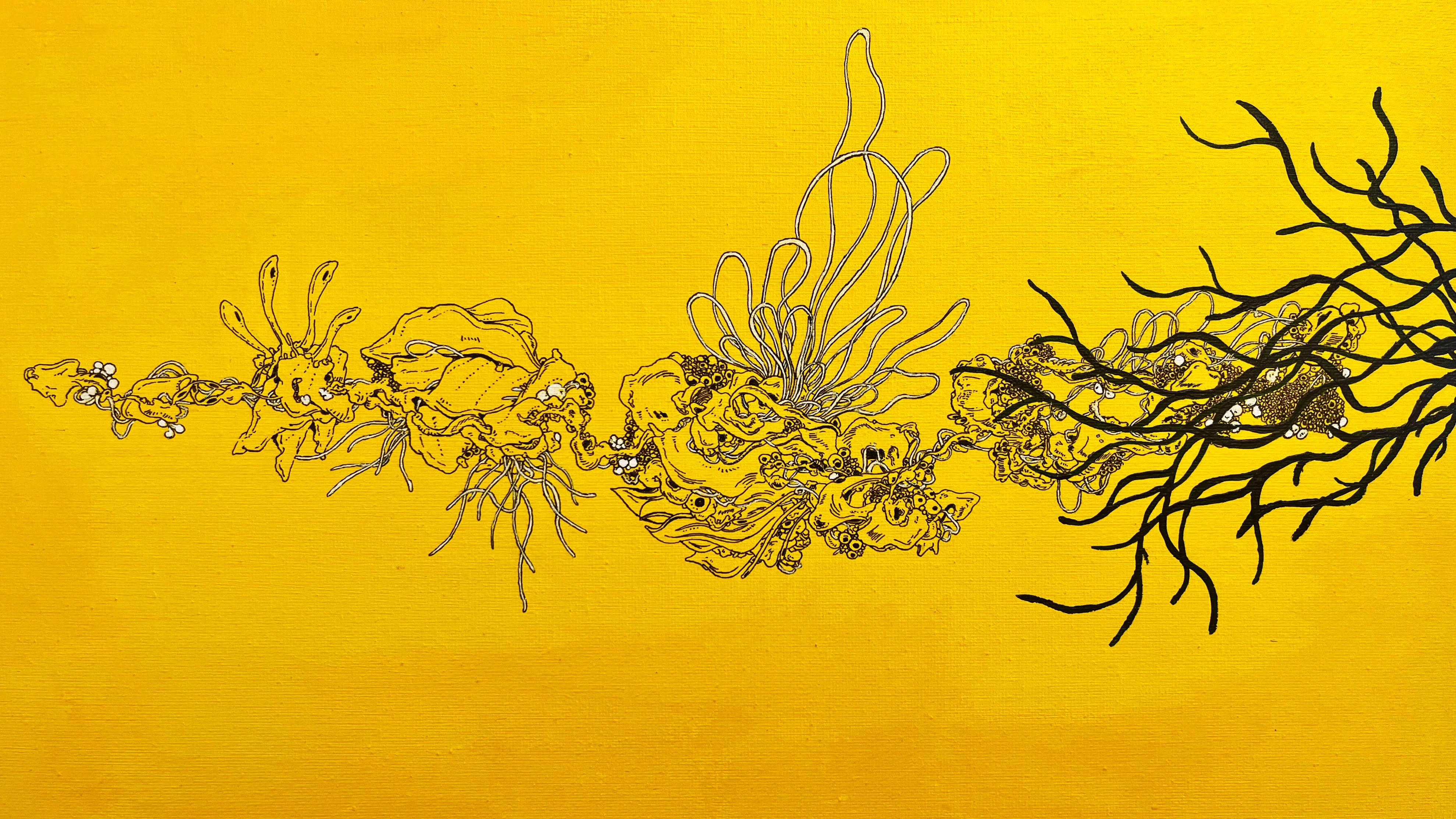
"Untitled" 2024
The great 19th century novelist, Honoré de Balzac, once said of letter-writing, when his mother complained of not receiving enough missives from her hard-laboring son: "A letter, for me, you see, is not only money, but an hour of sleep and a drop of blood." Writing is a great effort, a fantastic feat, a leap of faith over a fathomless canyon. And yes, writing can cost us our psychic drop of blood. Orwell equated the act of novel writing with struggling over a protracted illness; Nobel laureate Samuel Beckett used to break out into hives when toiling on his works; during the composition of Moby Dick, Melville used to stare into his fireplace for hours, immovable, locked in a mesmeric trance, possessed. A writer unsleeves the skin over the soul to reach into those parts which are most vulnerable, most secret. They sometimes face darkness to unveil a radiance. But the deeper one dives, the richer the rewards—even if what one faces is unpleasant. As the Bishop of Ely notes in Henry V: "The strawberry grows underneath the nettle,/ And wholesome berries thrive and ripen best/ Neighbored by fruit of baser quality." Writing is ecstasy, undoubtedly (that is, when the words join together beautifully, which doesn't always happen),but great writing exacts a price, even if its only the taxing of one's time—and time's arrow moves at a blistering velocity.
So lend your attention, and your time, to the creative wonders responsible for this issue's writing and art, for each individual published here has labored for our benefit. If you dip into one piece of writing, there's no doubt you'll be hooked. As the Arab proverb has it: "Once the camel gets his nose inside the tent, the camel will be inside the tent." Be the camel and put your whole soul into it. You won't regret it, for the voices here fling far and wide, like an array of stars. As the Mexican artist Rufino Tamayo put it: "In art, there are millions of paths— as many paths as there are artists." Be like the poet, surrendering to the moon-mad demand of their craft. Read with a feverish intensity, so you could explode within, like a fissuring sun.
You can begin with the striking thunder and sinewy lightning in Amarah McGuire's poem "Something Was Lost Before the First Sunrise." Then you could glide along the velvety pathway and enter the symmetrical integrity that makes up the composition of Layla Mesa's lovely poem "Claustrophobia." Hiromi Choi finds the shape of wild and fleeting emotion in "What is Madness?" And the lyricism does not end there. Madison Fishman's "Ode to the Painter by the Sea" considers the wizardry of an artist as he channels the elements, while Smila Gaulkin's ode praises a lover's hand as having heat and power that is equal to our own centralized sun.
If prose is more your meat, then check out Isabella Pardo's stark and startling "Amazonas," where a man on the cusp of madness, like a sun-scorched figure out of a Herzog film, finds himself adrift in the brutal green slither of the merciless Amazon. In Eli Kurland's "The Bomb" an obsessed father of two plays a few rounds of fateful street chess, which exacts a soul-stirring price. Elle Liu's endearing "Banana" evokes the sweet memories of the narrator's grandparents, while K. Sara's "Pathetic" finds its protagonist in the throes of a passionate affair with an actor twice her age.
But the new issue of The Match Factor does not end merely with fine storytelling. There are thought-provoking essays, brimming with delight. Ebba Zhang provides the details of a stimulating evening in the company of great poets, and Winifred Kenney's scintillating review of an exhibition of the art of Michael Kelly Williams provides insightful glimpses into the annals of Black art history. Olivia Schmidt offers a hot take on the extraordinary documentary 32 Sounds. And If you seek a more personal connection, look no further than Scillian Raaf Panepinto's meditation on old habitats and second-hand furniture, while Lexi Paulino's "Quitting" speaks directly to one of the great issues of our time (and seemingly all times since the advent of Marx): the exploitation of labor.
There is also the astonishing art of Yinan Li, whose cyclical work communes with the enormity of nature--and tells us how the beauty of the world endures.
Congratulations to all the winners of the 2024 Annual Humanities & Sciences Undergraduate Writing Contest. Your work is a testament to the continuity of great ideas and the fireworks of creativity, and it is inspiring to see so many young people who are a part of the SVA community immerse themselves in the joys and sorrows of writing. I'm proud of all of you!
Lastly, I want to shout out a million gracias to Laurie Johenning, Director of Operations in the Humanities & Sciences Department, for her saint's patience and dedicated work in helping to put together this issue; to Dr. Kyoko Miyabe, Chair of the Humanities & Sciences Department, for her stewardship of our important department; to Susan Kim, Assistant to the Chair, who has helped me through numerous technical difficulties (always kind and smiling); and to all of my colleagues at SVA, who work extremely hard and dedicate countless hours to the education and spiritual nurturing of the students in their charge. You deserve the moon—and all the stars, too! Have a wonderful holiday break, everyone!
Edwin Rivera, Writing & Literature Instructor, and Editor of The Match Factory

